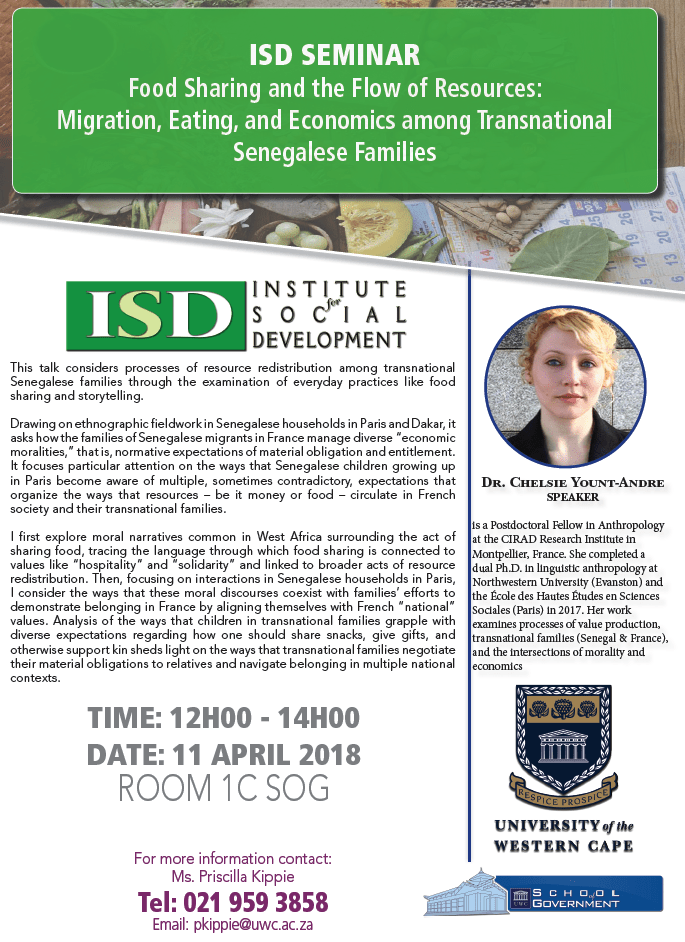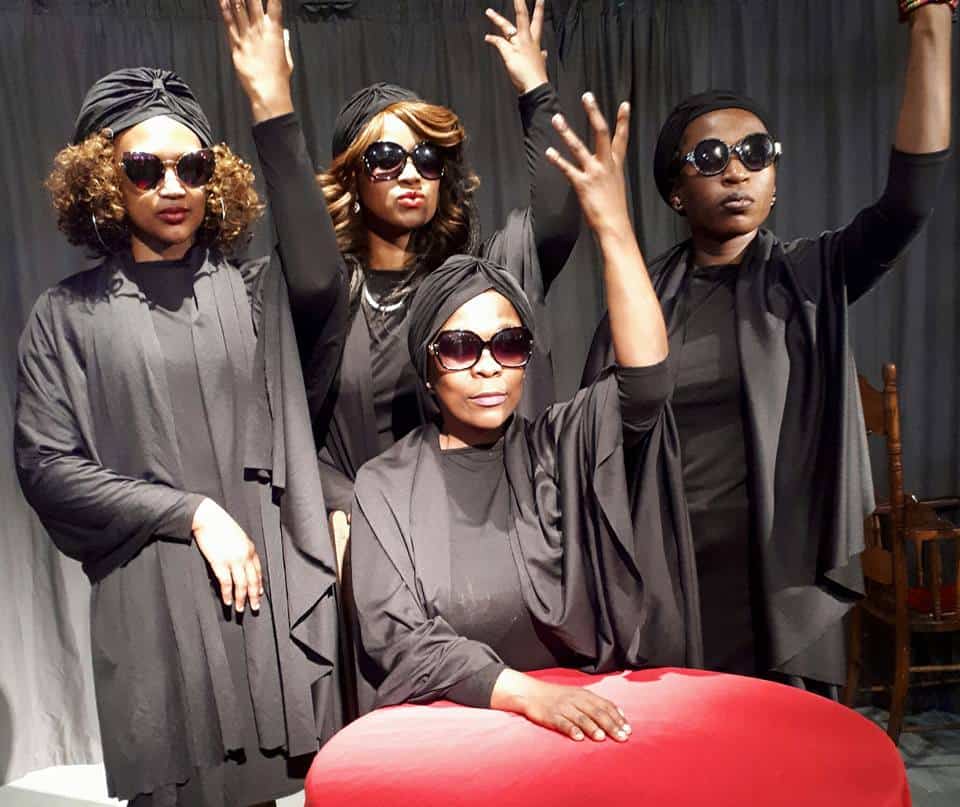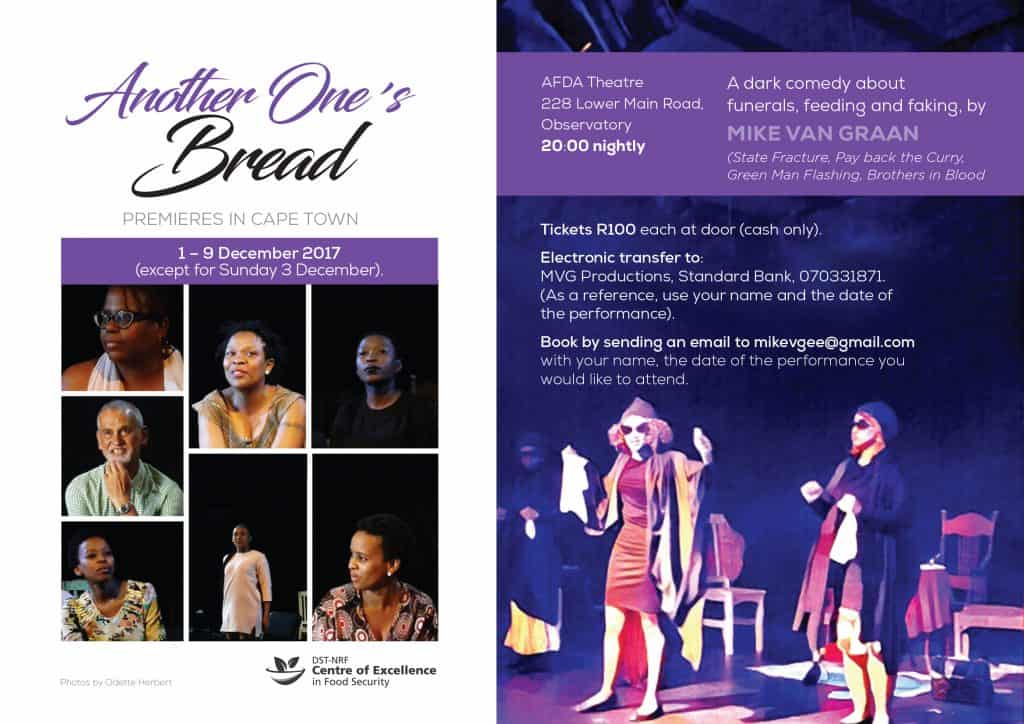Food Sharing and the Flow of Resources: Migration, Eating, and Economics among Transnational Senegalese Families
Date & Time: 11 April 2018, 12h00 – 14h00
Presenter: Dr. Chelsie Yount-Andre, Postdoctoral Fellow in Anthropology at the CIRAD Research Institute in Montpellier, France.
This seminar considers processes of resource redistribution among transnational Senegalese families through the examination of everyday practices like food sharing and storytelling.
Drawing on ethnographic fieldwork in Senegalese households in Paris and Dakar, it asks how the families of Senegalese migrants in France manage diverse “economic moralities,” that is, normative expectations of material obligation and entitlement. It focuses particular attention on the ways that Senegalese children growing up in Paris become aware of multiple, sometimes contradictory, expectations that organize the ways that resources – be it money or food – circulate in French society and their transnational families.
I first explore moral narratives common in West Africa surrounding the act of sharing food, tracing the language through which food sharing is connected to values like “hospitality” and “solidarity” and linked to broader acts of resource redistribution. Then, focusing on interactions in Senegalese households in Paris, I consider the ways that these moral discourses coexist with families’ efforts to demonstrate belonging in France by aligning themselves with French “national” values. Analysis of the ways that children in transnational families grapple with diverse expectations regarding how one should share snacks, give gifts, and otherwise support kin sheds light on the ways that transnational families negotiate their material obligations to relatives and navigate belonging in multiple national contexts.

Another One’s Bread premiers in Johannesburg
Another One’s Bread premiers on 11 January 2018 at the Market Theatre (Mannie Manim Theatre).
The complex dynamics of food insecurity, nutrition and hunger will play out on stage at the Market Theatre from 10 January in a new theatre production written by renowned South African playwright, Mike van Graan (When Swallows Cry), and directed by award-winning veteran TV actress, Pamela Nomvete.
Described by Van Graan as “a dark comedy about funerals, feeding and faking”, Another One’s Bread serves up the complexities associated with acquiring food and nutrition using humour, fact and the downright outrageous.
The show runs at 20:15 Tuesdays to Saturdays and at 15:15 on Sundays. Tickets are available via Webtickets or from the Market Theatre’s box office 011-8321641.

One of the cast members, Faniswa Yisa, is an ambassador for a campaign to collect sanitary pads for young women who may not be able to afford these. We invite all those who will attend the show during its run till 4 Feb to purchase a box of sanitary pads and place it in the collection box at the entrance to the theatre.
3rd International Conference on Global Food Security
Elsevier’s 3rd International Conference on Global Food Security will take place from 3 – 6 December 2017 at the Cape Town International Convention Centre. This conference is hosted in association with the DST-NRF Centre of Excellence in Food Security, the Universities of the Western Cape and Pretoria.
Global food security will require a holistic approach to address socio-political, natural, health, agricultural and food sciences to feed the 9 billion people. The food security challenge will must address the triple burden of malnutrition – undernutrition, obesity and micronutrient deficiencies. The Third International Conference on Global Food Security therefore aims to deliver critical analysis and innovative science that address the biggest threat ever faced by mankind.
Discussion sessions will contribute to a better understanding of behavioral, biophysical, economic, institutional, political, social and technological drivers and supply chain systems to contribute to global food security. The conference will address the food system activities of production (crops, livestock) or harvesting (freshwater and marine sources), processing, distribution systems and consumption behavior and the synergies and trade-offs between economic, environmental, health and social objectives and outcomes. The conference will provide a cross cutting view of multiple disciplines and spatiotemporal scales of analysis to span the drivers, activities and outcomes of food systems to reflect on the broad challenge of food security.
‘Another One’s Bread’ – Cape Town Premier
Time: 20h00

Another One’s Bread explores various themes related to hunger in the context of the relationships between four women – a retired teacher, a writer, an estate agent and an unemployed young woman. Like every other theme in South Africa, hunger intersects with a range of other issues – gender, class, apartheid’s spatial geographies, education and corporatisation of services to name but a few. What keeps these disparate women together is their membership of THE SUBSTITUTES, a group of professional mourners, hired to provide mourning or mourning-related services at funerals.
Another One’s Bread is a dark comedy that takes its title from the Afrikaans expression “een man se dood is ‘n ander man se brood” (one person’s death is another person’s bread”. Commissioned by the Centre for Excellence in Food Security at the University of the Western Cape, the play is directed by Pamela Nomvete and features Faniswa Yisa, Chuma Sopotela (recently announced as the 2018 Standard Bank Young Artist for “Performance Art”), Motlatji Ditodi and Awethu Hleli.
This play promises to entertain and provoke during this short Cape Town run from 1 – 9 December 2017 (except for Sunday 3 December) at the AFDA Theatre, 228 Lower Main Road, Observatory at 20h00 nightly. The play heads to the Market Theatre in January 2018.
Tickets and info:
Seating at the AFDA Theatre is unreserved and since the theatre is not linked to a ticketing agency, tickets (R100 each) may be purchased at the door (cash only) or by making an electronic transfer to MVG Productions, Standard Bank, 070331871. As a reference, use your name and the date of the performance for which you have booked e.g. P. Nomvete 4 Dec. (From the amount paid, we will see the number of tickets purchased). Alternatively, you may book by sending an email to mikevgee@gmail.com with your name, the date of the performance you would like to attend, and the number of tickets required, and then pay on arrival. As an option, also include your mobile number for more immediate communication. Should you make an EFT as above, you may also send an email to confirm your payment and details of your booking.
Food Politics and Cultures Festival: A Festival of the Arts, Humanities and Social Sciences
Hosted by the Food Politics and Cultures Project within the Centre of Excellence on Food Security at UWC, the festival brings together intellectual activists, scholars, students and artists to generate interdisciplinary conversations about and responses to the socio-political implications of food items, foodwork and food consumption. The festival will challenge the rigid and technical models that usually frame activism and scholarship about food, land and agrarian studies, and will focus on multidimensional, interdisciplinary and creative responses to and dynamic conversations about the myriadfacets of food in our lives.
Food is central to our day-to-day experiences of physical survival, pleasure and work. Yet scholarship rarely confronts this adequately, even though we live at a time when corporate capitalism controls the choices we make about food and how to grow and eat it; when the impact of harmful genetic engineering constantly threatens, what is on our plates; and when groups such as small-scale farmers, domestic cooks and artists are resiliently searching for liberating ways to grow, eat and think about food.
Other patterns related to food in our present include:
- The regional, national and global land and agrarian struggles that our current food distribution and consumption is based;
- The resilience of forms of food production cooking and eating that testify to the rich networks of food in our lives;
- The role of South African corporate capitalism and neo-liberalism in shaping food chains on the continent;
- The centrality of foodwork and cooking in feminised spaces that are often marginalised or trivialised;
- The centrality of food items, eating and cuisine in cultural representations of pleasure, sociality, conviviality and wellbeing;
- The pivotal role of food in fictional, dramatic and artistic representations of individual and collective experiences.
Broader themes for the festival include:
- Food politics, cultures, histories and geographies;
- Foodways, coloniality, racism and migration;
- Food and eating: representing social identities and lifestyle;
- Embodiment, the visceral and pleasure;
- Food struggles, food sovereignty and agrarian transformation;
- Nature/Society and the ecological crisis.
Responding to these themes, the festival showcases and celebrates new thinking by students and scholar-activists, as well as knowledge production in several genres including fiction, the visual arts and performance. The festival is also aimed at generating conversations between those working in the academy and specialist areas of cultural production, and the broader public.
The festival will include:
- Open lectures by eminent public intellectuals and scholar activists
- Panel Discussions
- A Visual Art Exhibition
- Talks and Demos
- Musical performances
- A new play by Mike van Graan titled Another One’s Bread (A dark comedy about funerals, feeding and faking, featuring Faniswa Yisa, Chuma Sopotela, Awethu Hleli and Lesedi Job, directed by Pamela Nomvete) and
- Celebrations and reading of new fiction-writing.
For more information, please Contact Lynn Mafofo, Thembelihle Bongwana or Rudo Chikara at foodpoliticsandcultures17@gmail.com
Violations of the labour rights of farm women in Western Cape and Northern Cape

Presenters:
Prof Stephen Devereux, Research Fellow, IDS, University of Sussex & Affiliate at Centre of Excellence in Food Security, UWC
and
Colette Solomon, Director of Women on Farms Project
Under apartheid, farm workers in South Africa had negligible legal protection and were subjected to human rights violations that included physical assaults, child labour, inhumane living conditions and evictions without notice. Since 1994, efforts to redress such injustices include the promulgation of a progressive Constitution and specific legislation, including the Sectoral Determination for Farm Workers. Nonetheless, farm workers continue to suffer illegal evictions, poor housing conditions and poor working conditions, while government does not effectively enforce legislation by taking action against non-compliant farmers. In this context, Women on Farms Project commissioned a research study into the nature and extent of non-compliance and labour rights violations on commercial farms in the Western Cape and Northern Cape, with a particular focus on women seasonal workers. Findings and recommendations will be presented in the areas of wages and contracts, labour rights, and occupational health and safety.
In this context, Women on Farms Project commissioned a research study into the nature and extent of non-compliance and labour rights violations on commercial farms in the Western Cape and Northern Cape, with a particular focus on women seasonal workers. Findings and recommendations will be presented in the areas of wages and contracts, labour rights, and occupational health and safety.
Follow seminar live on twitter: @FoodSecuity_za / @PLAASuwc #FarmWomenLabourRightsRoundtable Discussion on Access to Food for Students in South African Tertiary Institutions
The Socio-Economic Rights Project at the Dullah Omar Institute, University of the Western Cape, invites you to a roundtable discussion that brings together a cross-section of key stakeholders including lawyers, economists, public health practitioners, policymakers, food security experts, private sector representatives, government department representatives, chapter nine institutions, researchers, academics and student representatives, for in-depth engagement in the realisation of access to food for students in South African tertiary institutions.
RSVP: Ms. Keathélia Sapto | ksapto@uwc.ac.za |+27 (21) 959 2951/3708
FAO representative to present seminar at UWC
The DST-NRF Centre of Excellence in Food Security in partnership with PLAAS, invites you to a presentation by Ms Kazumi Ikeda-Larhed, Deputy Director of Partnerships, Advocacy and Capacity Development Division at the Food and Agriculture Organisation of the United Nations (FAO).
Ikeda- Larhed will deliver a presentation on the FAO’s work and FAO’s internship, volunteering and fellowship programmes, as well as knowledge sharing and e-learning with UWC students and faculty members.
The FAO is the United Nations Specialised Agency working with diverse partners, including academia and research institutes, towards the achievement of Sustainable Development Goals (SDGs), among which are SDG1 tackling Poverty and SDG2 which focuses on eliminating Hunger.
DATE: Friday 22 September 2017
SASAS 50th Congress
The South African Society for Animal Science (SASAS) will host its 50thCongress themed: “Golden Innovations for Sustainable Animal Agriculture”. The four day congress will take place at the Boardwalk Conference Centre in Port Elizabeth, from 18th -21st September 2017.
See the SASAS website for more information.
SAAFoST Congress 2017: Registration open!

A feast of food science and technology
Cape Town is the place to be for the upcoming Congress in September, where SAAFoST will welcome world-class local and international speakers. The South African Association for Food Science & Technology (SAAFoST) will hold its 22nd Biennial International Congress and Exhibition from 3-6 September 2017 at the state of the art Century City Convention Centre, Cape Town.
Congress theme
The theme of the congress, “A hunger for change: innovations, solutions and emerging technologies” will form a framework to explore solutions to the many challenges that food professionals face in the mission to provide a sustainable supply of safe, satisfying and healthy food.
Scientific programme and trade show
The programme is designed to cover topical and important issues affecting our profession and will provide a platform for young and established researchers to present their work. In addition to plenary sessions, themed parallel sessions will ensure a broad programme that will appeal to marketing and technical personnel. Speakers will include captains of industry and distinguished invited international food scientists. A trade show will run concurrently.
Who will attend?
The congress aims to attract over 600 delegates – not only from SAAFoST membership but also from the wider food industry locally, regionally and internationally. It affords a unique opportunity to network and the entertainment programme will ensure opportunities to make new acquaintances and catch up with old friends.
Opportunity to cement relationships
We invite you to participate in this, the most significant food event of 2017. There is no doubt that this congress will provide a unique opportunity to promote interaction and cement the relationships between industry, academic think-tanks and professionals. SAAFoST relies on your participation and we look forward to welcoming you to the Mother City.
Registration is open for SAAFoST Congress 2017. For more information, please visit http://www.saafost2017.org.za/registration.asp.